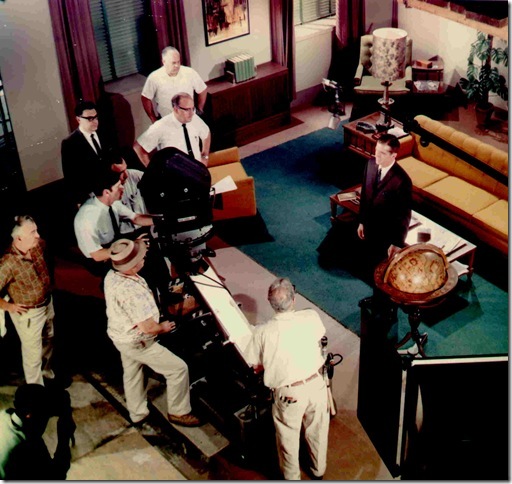|
|
|||||
|
|
|||||
|
Jerry J. Nugent wrote: In July of 1963 I was one of the few Marines who were assigned to APC for a 1 year tour of duty, for the purpose of gaining more experience in the area of motion picture production. It was the best assignment of my 10 years in the Marine Corps. My former duty station was with the East Coast Motion Picture Unit (USMC) in Quantico, VA. I loved my tour of duty at APC, and it seems that they liked me and my performance also, as when Walter Wood discovered, on the very day I was due to return to the Corps, that my enlistment was due to end in 6 weeks, he immediately told me to go back to the Civilian Personnel Office and fill out a Form 52. I returned to Quantico and sweated it out, as my company office was after me two or three times a week to come over and sign my re-enlistment papers. Shortly before my discharge date, I was (finally) contacted by the CPO at APC, and asked when I could report for work! I had been hired as an assistant cameraman! That was the highlight of my life, as I had long dreamed of working in a real studio, during “real” production work. The top cameramen I had the pleasure of working with, as an assistant cameraman, and later as a camera operator, included George Howell, Harry Kreider, Bob Sullivan and later even Chris Mauriello. The only time I wasn’t happy at APC was during the “dead” times between assignments. But I couldn’t sit around in the Cameramen Waiting Room, so I spent many hours down on the Main Stage, practicing using the Worrell head, in anticipation for getting the chance to be allowed to serve as camera operator for the cameramen who often shot productions on the stages of APC. Between production assignments, I also sometimes worked in Special Effects with Charlie Hemingway, who taught me how to use the equipment there and even shoot some of the assignments myself. As far as I know, Johnny Pagano...who often helped me set up a camera on a dolly...mentioned to Chris Mauriello what I was doing. The next time I was “practicing” Chris came by to look for himself and soon I found myself as camera operator on many of the stage productions. At the time, all the assistant cameramen were GS-8’s. After reading the official documents on how that grade was determined, I felt that there had been a mistake many years ago. It was plain to me, from what I read, that the correct grade for Motion Picture Production Assistant Cameramen should have been set as a GS-9. I took it upon myself to file the necessary papers, and after months of “fighting” Civilian Personnel Offices, even as far as up the chain of command as to Washington, DC, my contention was finally upheld, and all the APC assistant cameramen (myself included) were promoted to GS-9. I eventually was promoted by Joe Lipkowitz to Motion Picture Cameraman (GS-11) and held that grade until the closing of APC in 1970. I think the day they called all the employees together on the Main Stage for that announcement it was quite a blow. Since the Army realized the importance of maintaining a training film program, they transferred some of the production employees to other bases where audio visual had been established. Most of us in Camera Branch were transferred to other bases where parts of the mission had been re-assigned to. I was transferred to Aberdeen Proving Ground in Maryland, along with Pete Voustas, Frank Argondizza, Webb Turner and a few others from the Motion Picture Production Section, including at least one editor and one director...Phil Schuyler. Those of us who were cameramen were demoted to GS-10 and the production work became slow to become available. We were under control of the Aberdeen AV people, who in our opinion had very little, if any “production” experience. Since I wasn’t getting as much production work as I desired, I started editing some of the unedited films that had also been sent to Aberdeen along with the former APC employees. This eventually led to my being hired as an mopic editor at the Walter Reed Army Institute of Research (WRAIR) where the medical portion of the film program had been sent when APC was closed. I eventually retired from WRAIR in 1989, after subsequent promotions to producer-firector during my time there.
(Posted November 14, 2011) |
|||||
|
|||||


